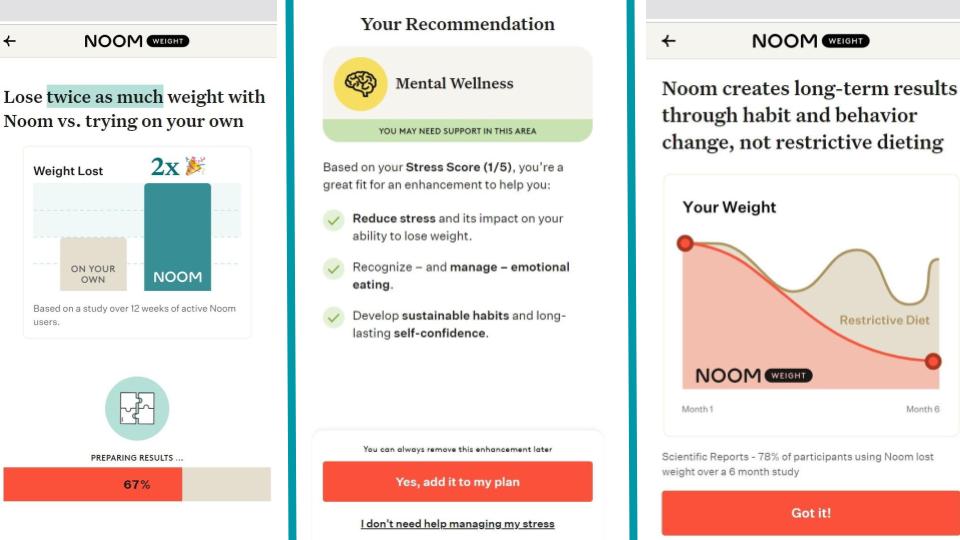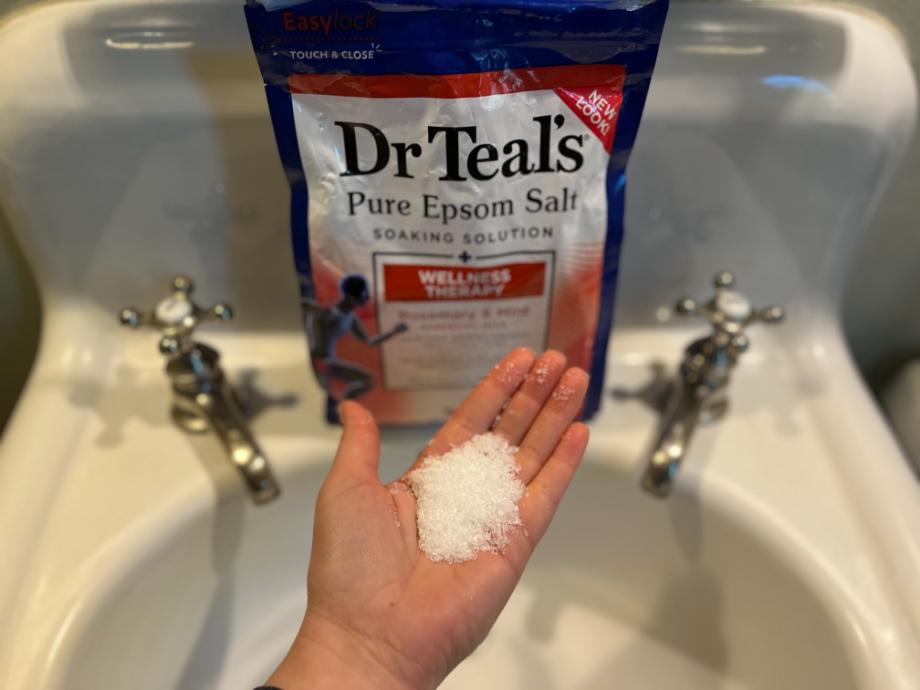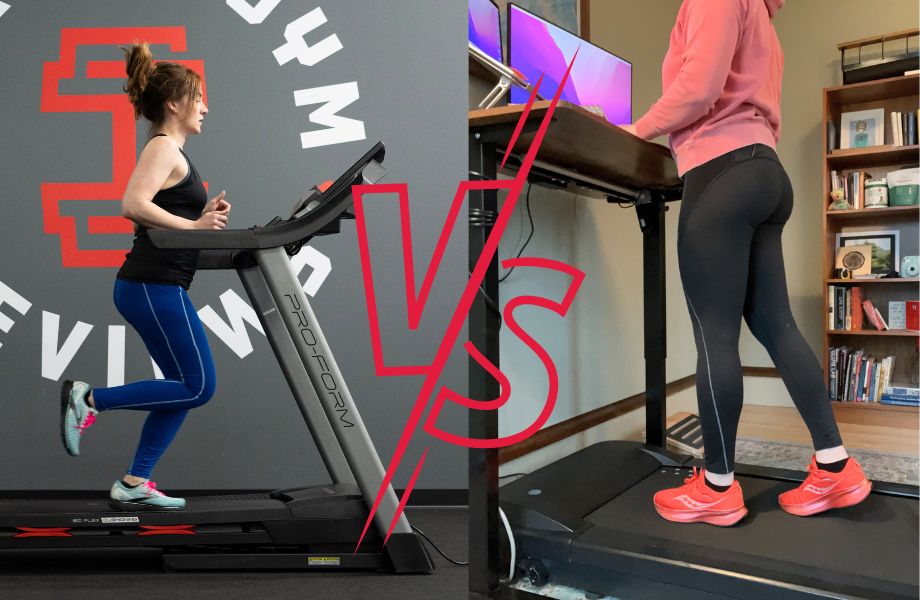For this Noom review, our team decided to test drive the weight loss app branded as “The Last Weight Loss Program You’ll Ever Need.” But what is Noom? And how does Noom work? The cornerstone feature of the Noom weight loss program is a color-coded system that indicates how calorie-dense a food is to better inform your choices.
RELATED: Best Weight Loss Apps
Along with this system are a series of sophisticated features that allow for calorie counting, check-ins with a health coach, and even healthcare prescriptions for GLP-1 medications like Wegovy for users struggling with obesity. It’s no doubt comprehensive and a bit pricey as a result, but is it worth it? Our expert tester put Noom into action to find out.
A Wellness App Made By Professionals and Tested By Professionals
Over the 10+ years GGR has been in operation, our team of certified personal trainers, registered dietitians, nutrition coaches, and health writers has tested more than two dozen of the most popular nutrition apps. As part of our GGR fitness equipment testing methodology, each app is scored based on a number of key factors, including:
- Price: In our ratings, free and low-cost apps earn high marks for affordability and overall value. Apps that offer a high value for their cost can also earn a high mark in our rating, which is on a scale from 1 to 5.
- Accuracy: The accuracy of tracking calories and macros is critical, especially for beginners. An app that earns a 4 or 5 in our ratings has a large, verified library of active entries that are kept accurate, while a lower-rated app has limited or inconsistent entries.
- Functionality: Users should find an app easy to use, even if they are beginners. The top-rated apps are reliable, intuitive, and free from glitches, with free versions offering very good value.
- Tracking Features: Weight loss is one goal for some users, while building muscle, gaining weight, or improving overall health are others. An app that earns a 4 or 5 in our ratings tracks calories, macronutrients, and progress checks, while a lower-rated app tracks only calories and weight with no behavior change features.
Noom is built on the psychology of weight loss. Instead of specific nutritional guidance, you’ll get lessons that are designed to help you break habits that may be contributing to your weight gain.
A Quick Look at the Noom App
Noom is a weight loss app that positions itself as being like no other, as it focuses on healthier habits rather than a meal plan or a calorie goal. Instead, it uses a simple color-coded system. It urges you to eat more “green foods,” a category that includes most fruits, veggies, and whole grains.
RELATED: The 8 Best Calorie Counter Apps
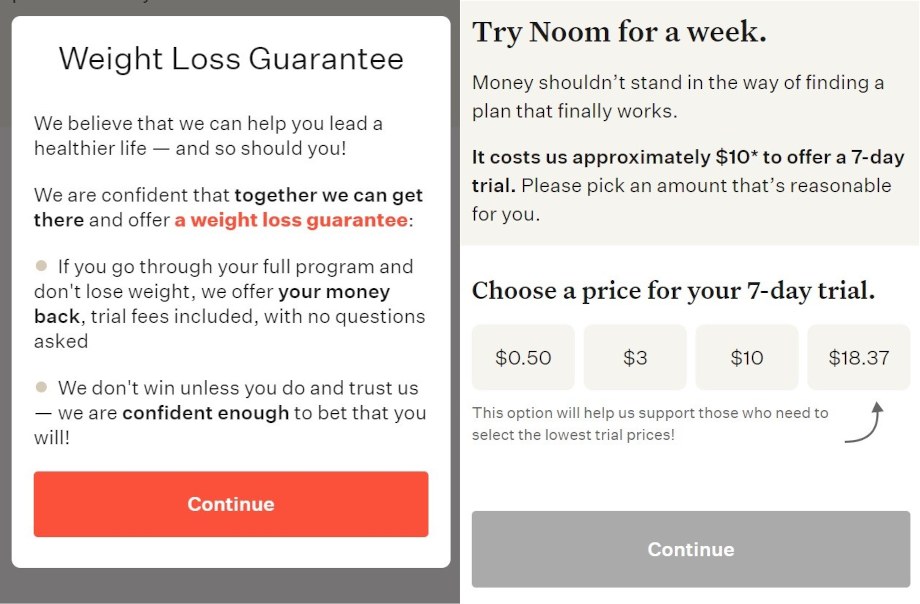
Yellow foods are to be eaten in moderation and orange foods, which tend to be the most calorie-dense, are to be avoided. Orange foods actually used to be red foods, but Noom received backlash for the stigma and potential of people using the program to categorize certain items as “bad foods.”
Before You Buy
- You must get through a firewall of quizzes and questionnaires to get exact pricing.
- If you’re looking for weight gain, Noom may not be a fit for you.
- If you don’t own smart devices, it’ll be difficult to use.
Is Noom Worth It?
Studies have shown that mobile apps can be more effective1 than in-person check-ins. However, does the app teach you healthy eating? Famously, registered dietitians don’t think so, especially since the color system can lead some to believe certain foods are off-limits.
“Noom focuses on habits and behavior change rather than restrictive dieting, which is much more likely to result in sustainable weight loss,” says Perry Nix, RD, LD. However, she adds, “Noom’s color-coding system may be triggering for those with a history of disordered eating. A ‘red’ or ‘green’ food could easily be interpreted as ‘bad’ and ‘good.’ This type of labeling can lead people to feel guilt or shame when eating.”
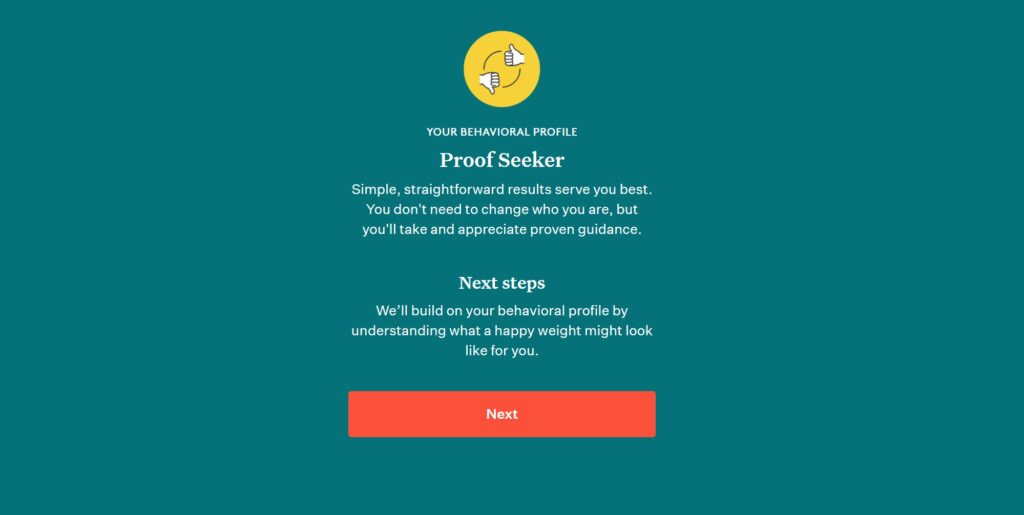
That said, if you’re not prone to those downsides and ready for the time commitment and the $70+ monthly cost, Noom can be a program that is more comprehensive than most food logging apps and can help you reach a healthy weight with the right in-app counseling.
Great for:
- People looking to lose a significant amount of weight
- Those looking for a simple way to reach a low calorie goal
- Individuals who want more than just food tracking
Not recommended for:
- Active individuals looking to put on lean mass
- People with a history of disordered eating
- Those who don’t have a budget for auto-renewing programs
Noom Specs
| Price | $70-209/month (depends on the results of your Noom quiz and projected weight loss timeline) |
| Free Trial Period | 14 days |
| Subscription Levels | Noom Med, Noom Premium |
| Supported Diets | Customized |
| Key Features | Noom Premium: Color-Coded Guidelines, Body Scan, Behavior Coaches, Food Tracking, Barcode Scanner, 1:1 Coaching, Personalized Meal And Exercise Plans Noom Med: All Premium plus access to clinicians and potential prescriptions for GLP-1s (Glucagon-Like Peptide-1 Agonists) like Wegovy, Zepbound, Ozempic, Mounjaro, and liraglutide |
| Available On | iOS and Android |
Experience Using Noom
Our GGR team member and expert tester Sarah Price was impressed overall by the app’s ability to positively change eating habits and food choices. There were also some features she raved over, along with some she thought the app should include. Despite some technical complaints and frustration over the high price, she ultimately gave Noom a 3.67-out-of-5 rating overall.
RELATED: Best Weight Loss Program For Women
Read on for a closer look at what she thought of the app and how she rated it in our key categories.
Price
Let’s start with the biggest criticism: Noom’s cost. Sarah rated the price 2 out of 5 after offering this commentary: “You are charged according to how many months you commit to losing weight with Noom.” This duration is based on a series of lengthy quizzes and questionnaires you have to get through.
Though the thoroughness is admirable and, admittedly, necessary to provide way more individualized recommendations than your typical diet app, it’s not ideal for people who want fast transparency to assess if they have the budget to use Noom.
“I was told it would take me seven months, based on how much weight I wanted to lose and other factors,” Sarah continues. “As a result, I was charged about $105 for the seven months. Next, if you would like to continue, you can pick another duration of your choice.” According to our research, it appears that the longer you commit to using the Noom app, the lower the price is.
Functionality
Sarah was a big fan of this aspect of the Noom weight loss program, rating functionality a 5 out of 5. “I love the Noom app,” she raved. “Using it is a breeze, and it provides just enough information. On the day’s home screen, you log your meals, enter your weight, and see your readings for the day. I like that it is bite-sized and just enough for one day.”
RELATED: The Best Personal Training Apps
Tracking Accuracy
We rated this platform’s food tracking accuracy a 3 out of 5 based on Sarah’s feedback. “When you type in the food or scan the barcode, most of the time it shows up in the app, and this was very helpful,” Sarah reports. “It only ever asked for help in building the database once because my food wasn’t in it, so the database asks you to help create it. The carbs, proteins, sugars, and calories of your food are entered, and your food is saved for future use.”
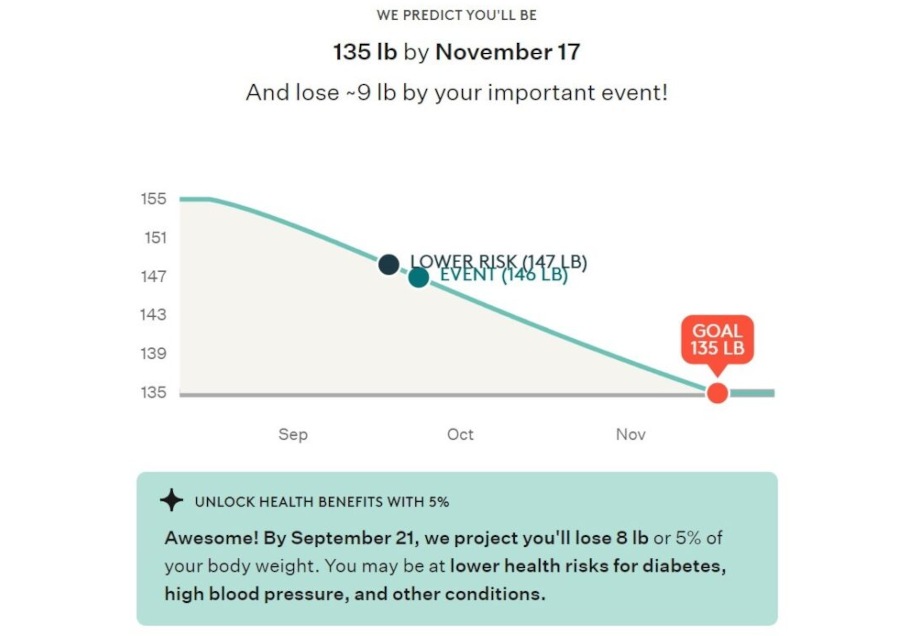
Now, it makes sense that Noom would want to expand their database by having users enter possibly novel, unique, or foods that are brand new to the market to help other users. However, much like MyFitnessPal, user error is a huge thing to consider.
If someone enters calorie and macro data inaccurately, it can throw off the calorie tracking of the next person who may enter the same food without checking the data for validity. As such, users will have to stay vigilant in their food logging.
Progress Tracking
Sarah says, “Initially, I wanted to track macros, and it doesn’t automatically do that. It keeps track of calories and weight loss. It does track food types, such as red, orange, and green foods, which I like. I started learning what the ‘color’ of the food was and how many calories those foods consumed per day. It has changed my habits to eating more green foods than orange or red.”
“It ensured that I ate enough protein, which was my original concern. Your blood glucose level, blood pressure, activity level, steps, and water intake can also be tracked. There are also daily lessons and readings to complete.”
RELATED: How Much Protein To Gain Muscle?
As a registered dietitian, I have to appreciate the educational aspect of the program which is vital to creating healthy habits to help sustain any weight that is lost. Overall, we rated progress tracking a 3 out of 5.
Features
Sarah rated features a 5 out of 5, as she seemed impressed by what Noom offers. “A personal accountability health coach will text back and forth with you through the app. You can ask them anything, and they’ll get back to you within hours,” Sarah says.
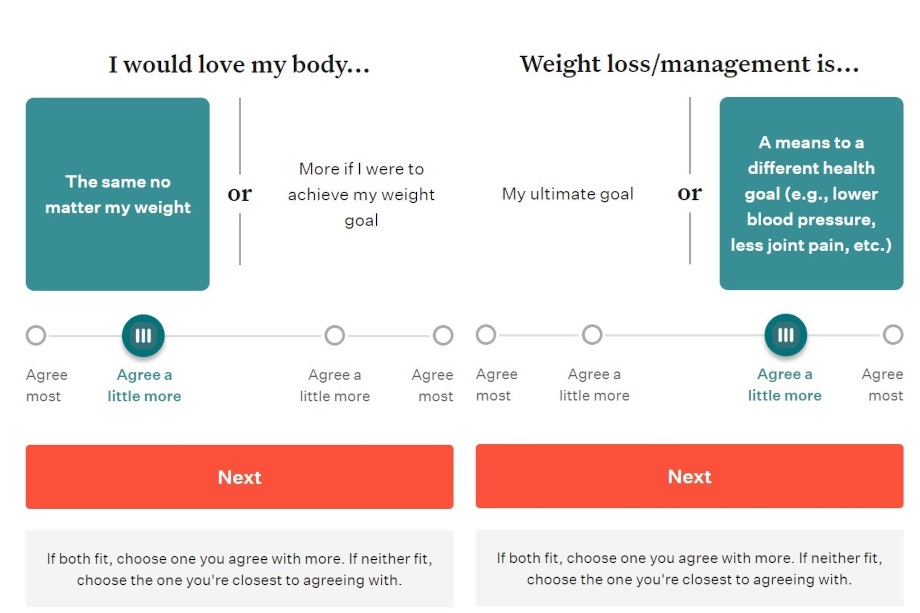
“Unlike other apps I have used, Noom is all about behavior change. It feels like I have a psychologist helping me. In addition to weight loss, the program focuses on why you eat the way you do and helps you make better choices. As a result, if I want to eat ice cream, I can search for alternatives, which gives me other options.”
Compatibility
“Due to the fact that I have only seen this connecting to Apple Watch and am not sure about Android, I am giving it a 3 out of 5 for compatibility,” proclaims Sarah. “However, my phone is my main tool for managing everything. A scale that includes Bluetooth and Wi-Fi costs $99 and can be purchased from them. Daily weigh-ins sync with the app and your weight is tracked.”
We found that Noom does, in fact, sync with Google Fit on Android. However, it’s recommended you have a more updated version, and the process of syncing with a non-Apple smartwatch can be more complicated.
RELATED: Best Smart Scales
Community Features
“It’s up to you whether you want to share your results with others in the app,” Sarah reports. “In the event that my doctor wanted to see my tracker, I could save all the meal information, including daily calorie intake, and send it to them.”
Given how Noom users can perform check-ins by sharing as much or as little as they want to get the support they need seamlessly, we rated it a 5 out of 5 for community features.
Noom vs MyFitness Pal
MyFitnessPal is one of the OG calorie counting apps on the market. The free version is available for looking up food per item and creating recipes, but does not allow you access to the barcode scanner. The Premium version grants you access to macronutrient data, intermittent fasting, food comparison, and the barcode scanner.
What our tester says:
“I think this is one of the easiest apps I’ve ever used. It’s super user-friendly.”
Both apps are available for both iOS and Android devices, and both have food tracking features with a focus on calories. However, the biggest difference is MyFitnessPal can be used without a subscription fee. Noom users will have to purchase a plan eventually, and it’s much more expensive than MyFitnessPal’s premium plan.
Noom offers more medical support and access to nutritionists and health coaches than MyFitnessPal through their plans. MyFitnessPal allows users to focus on macro and micronutrients while Noom focuses on coding or scoring foods, much like WeightWatchers.
For more details, you can read our full MyFitnessPal app review.
| Noom | MyFitnessPal | |
| Price | $70-209/month (depends on the results of your Noom quiz and projected weight loss timeline) | Free, Premium ($79.99/year or $19.99/month), Premium+ ($99.99/year or $24.99/month) |
| Free Trial Period | 14 days | Yes (free version always available) |
| Subscription Levels | Noom Med, Noom Premium | Premium and Premium+ |
| Supported Diets | Customized | Balanced, Flexitarian, Keto, Low-Carb, Mediterranean, Paleo, Pescatarian, Vegan, Vegetarian, Whole-Food Focus |
| Key Features | Noom Premium, Noom Med | Free, Premium, Premium+ |
| Available On | iOS and Android | iOS and Android |
Customer Experience
We rated a 2 out of 5 for customer service based on both our tester’s experience and feedback from Noom users. Sarah found it to be fairly easy to manage her Noom subscription and talk or text with someone at the app to get support. She also reported good experiences communicating with Noom’s health coaches.
However, a lot of Noom users complained of issues with canceling the auto-renewing feature, the usefulness of daily lessons, and about getting support with receiving refunds even after cancelling.
Downloading Noom
For Apple devices, you can download the Noom app free from the App Store, and for Android devices, you can download it from the Google Play Store. Just search for Noom, Noom Weight Loss, or Noom Food Tracker.
Customer Reviews
The Noom app holds a 4.7-out-of-5-star rating in the Apple App Store based on an average of nearly 850,000 reviews. Critical reviews ask for features such as an ability to save certain journal entries to keep better track of goals.
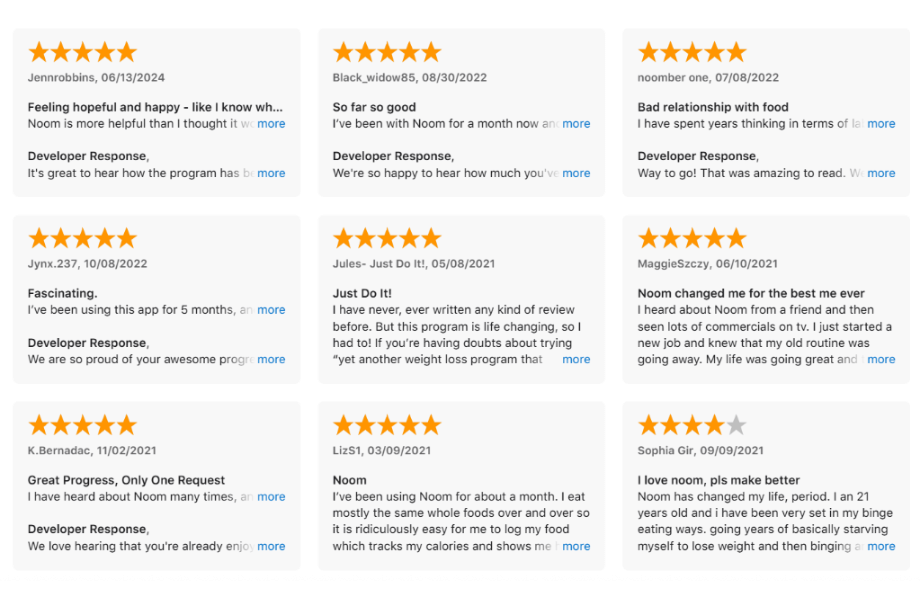
On Google Play, reviews are slightly less glowing at an average of 4.2 out of 5 stars based on over 315,000 customer reviews. Positive reviews praise the Noom program for its effectiveness at reaching their weight loss goal, but critical reviews criticize the high price.
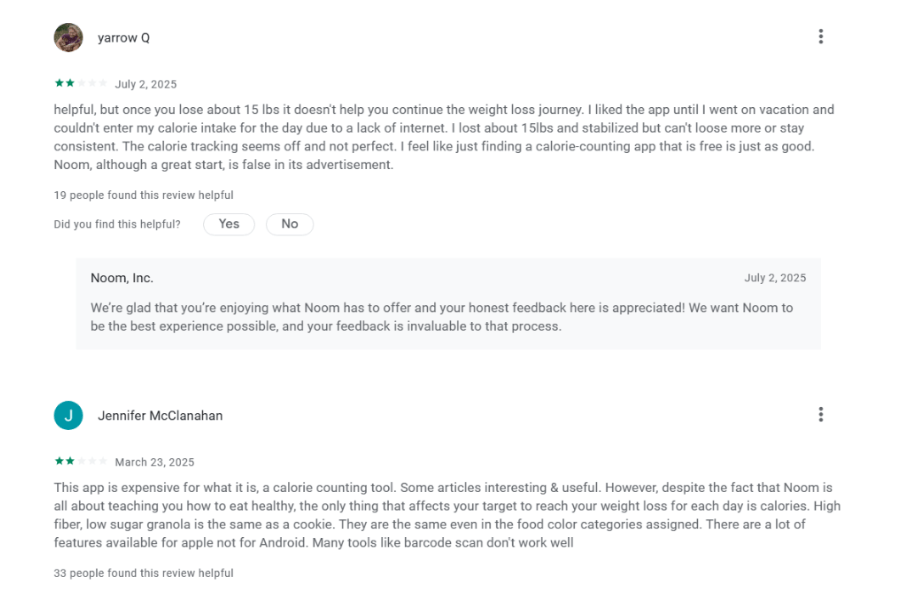
Final Verdict of Our Noom Review
The platform is impressively constructed compared to other popular weight loss apps, which don’t often focus on behavior change the way Noom does. Food tracking apps also don’t always come with an educational component like the daily lessons offered by Noom—and we find they can make a more significant impact by using education to empower users to keep the weight off after their subscription has expired.
The bad news is the color-coded system is almost too simple and can make people label certain foods as off-limits. This could lead to healthier habits and smarter food choices, but categorizing items as “bad foods” could lead to a poor relationship with food. Furthermore, some of the recommended calorie ranges could be so low, it wouldn’t be safe for someone with a history of disordered eating to use Noom.
So, does Noom work? It appears to have the ability to, according to thousands of reviews. But it might not be worth it for everyone.
Noom

Noom is built on the psychology of weight loss. Instead of specific nutritional guidance, you’ll get lessons that are designed to help you break habits that may be contributing to your weight gain.
Product Currency: USD
Product Price: 70.00
Product In-Stock: InStock
3.67
Noom Review: FAQs
Does Noom actually work?
According to customer reviews, Noom can be an effective tool for lower body weight and calorie tracking, but it may not be effective for everyone.
What are the cons of Noom?
The cons of a Noom diet plan include lack of structured guidance for sustainable lifestyle changes, a skewed focus on calorie range rather than wellness, and a high monthly cost.
What are the allegations against Noom?
In the past, Noom has faced lawsuits pertaining to their cancellation policies and has been accused by nutritionists of promoting calorie-tracking practices that can lead to disordered eating.
What does Noom cost a month?
The monthly costs of the Noom diet app depends on your individual weight management timeline, which is determined by taking a comprehensive wellness quiz.
References
- Ufholz K, Werner J. The Efficacy of Mobile Applications for Weight Loss. Curr Cardiovasc Risk Rep. 2023;17(4):83-90. doi:10.1007/s12170-023-00717-2




